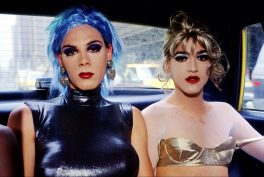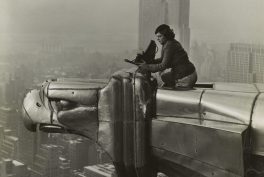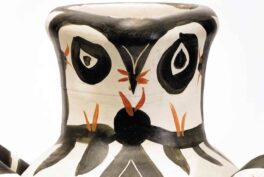Nan Goldin: This Will Not End Well
Nan Goldin is among the most influential—and the most provocative—photographers of our time. Surprisingly, there is not a single photograph mounted on the walls of her latest retrospective. That’s because This Will Not End Well is actually Goldin’s debut solo exhibition as a filmmaker.
Innovative and evocative, the exhibition showcases six slideshows projected inside six interactive structures. Each slideshow features hundreds of photographs that span decades of Goldin’s storied life and career, all set to an arresting array of music and narration. The exclusive focus on slideshows instead of static photography prints reflects Goldin’s vision of how her oeuvre is best experienced in the midst of constant individual and collective change. “I found a way to make films out of still images,” explained Goldin. “Making slideshows gives me the luxury of constantly editing to reflect my changing view of the world.”
“This will not end well” is a tongue-in-cheek phrase you might hear during a petty argument. It is also a serious and foreboding observation about the world we live in. Existential and ever-changing threats are looming—from war, climate change, and human rights violations on a global scale to individual struggles with addiction and mental illness. At the same time, joy and delight can always be found. Nan Goldin’s slideshows catalog the disparate facets of life and challenge us to ponder the paradoxical beauty and chaos of their collectivity.
A Village of Slideshows
Nan Goldin began her career in New York City in the 1980s. She first showcased her photography in nightclubs and underground cinemas before achieving mainstream recognition in the American contemporary art world. As a photographer, technical mastery and aesthetic precision have never been Goldin’s ambitions. Rather, her brazen yet affectionate truth-telling—particularly of marginalized people’s stories—is what makes her such an influential photographer.
Described by the artist as “a village of slideshows,” This Will Not End Well features six retrospective collections of Goldin’s work:
- The Ballad of Sexual Dependency (1981–2022) is widely considered to be Goldin’s magnum opus, illuminating the intimate complexities of human relationships.
- The Other Side (1992–2021) is a bittersweet tribute to Goldin’s transgender and drag queen friends, whom she photographed from 1972 to 2010.
- Sisters, Saints, and Sibyls (2004–2022) gives a moving account of Goldin’s sister’s death by suicide and the artist’s own experiences with mental illness.
- Fire Leap (2010–2022) offers a whimsical glimpse into the world of children. Goldin captures their lives with genuine curiosity and a reverence not often granted to young subjects.
- Memory Lost (2010–2021) is a haunting, claustrophobic journey through the throes of drug addiction and withdrawal.
- Sirens (2019–2020) compiles found footage to pay homage to Donyale Luna, considered the first Black supermodel, who died after an overdose in 1979.
A frequent collaborator with Goldin, the architect and curator Hala Wardé designed the six structures in the exhibition. The shape of each fabric-laden cinema is unique, and their entrances are not always obvious. They incite physical interaction and emotional resonance in tandem with the themes and subject matter of the slideshows. Whether it’s passing through a playfully circular passageway for Fire Leap, or navigating a dim corridor with a dropped ceiling for Memory Lost, viewers are pushed to participate in the stories.
Connection Over Consumption
As we all know, 21st-century humans are conditioned to consume constant streams of content. Additionally, with the rise of artificial intelligence, we can’t always ascertain the origin or authenticity of what we consume. This Will Not End Well showcases hundreds of images in quick succession without providing contextual details—like date, location, or title—for any singular photograph. However, Nan Goldin’s holistic vision as a filmmaker fosters deep connection rather than shallow consumption.
Goldin has spent decades curating the selection of images in each slideshow, the order in which they appear, and the multisensory details of their presentation. This approach prompts an intuitive and focused interpretation of each slideshow as a singular entity—instead of gathering information about individual people or scenes, exhibition-goers are immersed in an overarching yet intimate facet of the human experience.
Photography as Activism
By lovingly witnessing and creatively preserving moments from marginalized people’s lives, Nan Goldin’s photography functions as both art and activism. The Ballad of Sexual Dependency, for example, features members of Goldin’s community who were lost to the AIDS crisis. In a published version of the Ballad Goldin said:
In the 1980s, Nan Goldin curated the first major art show to address the AIDS crisis. This exhibition, considered controversial at the time, was just one of many daring yet effective acts of artistic protest by Goldin. In 2017, Goldin founded P.A.I.N. (Prescription Addiction Intervention Now), an advocacy group aiming to hold Purdue Pharma and the Sackler family accountable for the opioid crisis. P.A.I.N. organized headline-grabbing protests at major art institutions in the United States, England, and France. Many of these institutions have since divested from Sackler funding and removed the family name from gallery walls.
Exhibition Details
Since its 2023 debut, This Will Not End Well has completed successful, sold-out stints in Stockholm and at the Stedelijk Museum in Amsterdam, where Nan Goldin first exhibited slideshows in the late 1980s. It opens now at the Neue Nationalgalerie in Berlin, Germany and will be on view until April 6, 2025.
Additionally, a new book was published in 2022 to accompany Goldin’s retrospective. The most comprehensive volume of Goldin’s work as a filmmaker, Nan Goldin: This Will Not End Well features all the exhibition’s photographs in the same format and sequence as the on-site slideshows.
The exhibition is set to appear next at the Pirelli HangarBicocca in Milan, Italy (October 2025–February 2026); and the Grand Palais in Paris, France (March–June 2026).












